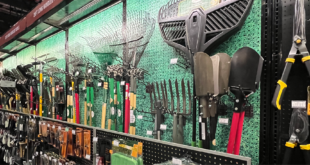Managing returns and developing a return policy that protects your business and keeps customers coming back for future purchases can vary depending on the needs of your business and your customers. Hardware Retailing explored that concept and presented one retailer’s solution. Read the article here.
To gather more opinions on returns, we turned to students enrolled in the North American Retail Hardware Association’s (NRHA) Retail Management Certification Program. The group recently visited NRHA headquarters in Indianapolis for its second visit of the Spring 2018 program. During their visit, Hardware Retailing talked to the group about their philosophies on returns. Read on for some highlights from their conversation.
On What They Won’t Take Back
Part of a return policy is protecting your business from lost sales, which means there are some items that just can’t be returned because they can’t go back into stock to be sold again. We asked the group of students what types of products they don’t accept for returns, and their answers varied.
Many students had lists of items they don’t return similar to Hartville Hardware, including toilet seats, special orders and cut items, such as wire or pipe. Other items that made the list include hand and power tools and tinted paint.
Emergency and seasonal items were also included on many retailers’ lists. Many cited instances of customers attempting to return generators after a summer storm or snow shovels after a blizzard.
Items that could potentially be hazardous if tampered with were also on the list, including ammunition and electrical parts.
The most head-turning item that a retailer mentioned they don’t accept for returns? Chickens, unless they’re a special order. In that case, the special-ordered chicks are guaranteed for about 24 hours, because the retailer has 72 hours to notify the hatchery if a chick doesn’t survive.
On Making Exceptions
Not every product will work for every customer, and most students agreed that there are some cases when it’s OK to make exceptions to the return policy to make a customer happy.
One student shared a story about an employee who sold cut chain to a customer and told her it would fit with a particular lock. She brought the chain back because the lock didn’t fit, and they exchanged the chain for something else that did work.
Several retailers agreed that sometimes it’s better to return a product and mark it as defective, especially if it gets a defensive, belligerent customer out of the store to avoid further conflict.
On Returns Being Part of Customer Service
The group of retailers we talked with each had their own perspectives on return policies and about how to ensure their policy does what it can to mitigate loss (printing the return policy on receipts and on store signage), they did agree that providing service and product knowledge is the best way to prevent returns in the first place. Here are a few ideas the group shared to help avoid customers coming back to the store to make a return.
- Double check sizes and quantities of a product before following through with the sale.
- Explain the return policy clearly on items that aren’t returnable or have special return circumstances, such as a smaller window for returns.
- Asking them to call the contractor or person managing the project to confirm any information they’re unsure about.
- Selling the customer the product they need, rather than the product they want.
For more insight into returns, download the overview of highlights from big-box retailers’ policies here.
 Hardware Retailing The Industry's Source for Insights and Information
Hardware Retailing The Industry's Source for Insights and Information








